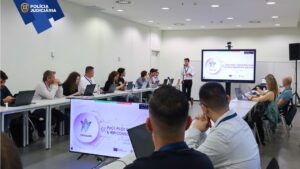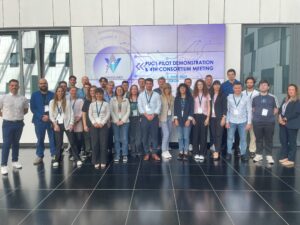VANGUARD PUC1 – First Demonstration in Lisbon
21 November 2025

Within VANGUARD, a series of pilot activities will be conducted to evaluate the developed solutions in an operational context and determine whether they align with end-user needs and effectively support their day-to-day activities. For each pilot activity, a dedicated scenario is created, focusing on particular aspects relevant to end-user requirements, in order to evaluate the developed solutions in a more controlled and focused environment. In this context, the first Pilot Use Case (PUC1) in Lisbon aimed to test the VANGUARD ToolSuite in a focused operational scenario, namely the detection of online advertisements with indicators of potential human trafficking, particularly in relation to sexual exploitation.
The objective was twofold; First, to assess the usability of the VANGUARD ToolSuite within a realistic investigative workflow. Second, to gauge its operational relevance at the current stage of development and identify what already adds value to day-to-day tasks and what requires refinement in the next iteration. To ensure a responsible and representative exercise, the pilot used controlled tests in simulated scenarios rather than sensitive live data. This approach allowed investigators to work through the whole flow, screening, triage and review, while maintaining a clear boundary around data protection and ethics.
The demonstration took place on June 3rd, 2025, at the headquarters of the Portuguese Criminal Police (Polícia Judiciária, PJ) in Lisbon, in close collaboration with criminal investigators from the National Unit for Counter-Terrorism (UNCT), which is responsible for investigating Trafficking in Human Beings (THB)-related crimes. Participants from UNCT engaged directly with the VANGUARD ToolSuite in a hands-on session, using the particular solutions prepared for PUC1 and the corresponding scenario.
The activity followed a simple structure:
- A short briefing on the scope and scenario;
- Execution of controlled tests under simulated conditions;
- A practical session where participants explored the relevant modules of the VANGUARD ToolSuite;
- A structured feedback collection session to capture observations and recommendations.
This format ensured that the time on site focused on how the VANGUARD ToolSuite supports the investigative steps specific to the scenario (from initial identification to preliminary triage), rather than on tool configuration or technical setup.

The session achieved its core purpose: it validated the chosen scenario’s relevance to PUC1. It enabled the team to collect structured feedback on how the ToolSuite supports investigative work in this domain. Participants completed the planned tasks within the simulated scenario and provided concrete comments on usability and workflow.
From an operational perspective, the pilot confirmed that a scenario-centric approach is appropriate for evaluating the ToolSuite at this stage. Working through the steps of detecting and reviewing online ads with potential trafficking/exploitation signals proved useful for discussing how the ToolSuite should present information, support risk analysis, and facilitate the capture of initial findings for follow-up. The gathered feedback will guide short-term improvement priorities and help align the next iteration with day-to-day investigative needs.
The main lesson learned is straightforward: early, focused exercises with end-users are essential for steering development decisions. By using simulated data and a controlled environment, the team was able to keep the discussion on operational utility and usability, which are precisely the areas that matter most before expanding to broader pilots.
Given this, and based on the Lisbon demonstration, the expected next steps for VANGUARD are:
- The project team will incorporate the structured feedback from PJ into the next iteration of PUC1, focusing on refinements directly tied to the tested scenario.
- The VANGUARD ToolSuite should begin the development of tools directed at the second scenario under PUC1, focused on recruitment.
- Additional hands-on sessions are expected to follow to confirm that the adjustments meet user expectations.
- The pilot materials (scenario brief, test scripts, feedback forms) will be updated so that subsequent sessions build on a consistent baseline and track progress over time.
In short, the Lisbon pilot delivered exactly what was intended at this phase: a clear check on usability and operational relevance in a controlled, scenario-driven setting, along with a concrete set of inputs to shape the upcoming iteration of PUC1.

